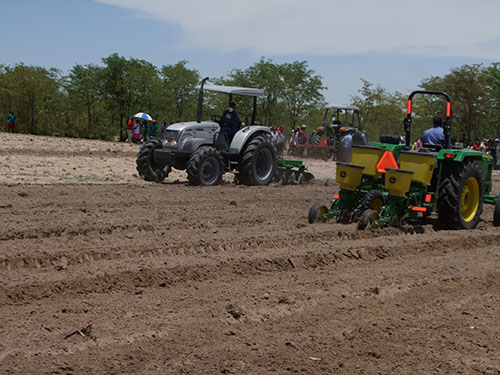Albertina Nakale
The government has made N$30 million available for the implementation of rain-fed crop production programmes.
This comes at the time when the rains have started pouring heavily in most parts of Namibia.
The ministry of agriculture is implementing agronomic programmes such as the Dry Land Crop Production Programme (DCPP), complemented by the Cereal Value Chain Development Programme (CVCDP) and the Comprehensive Conservation Agriculture Programme (CCAP) among others.
In an interview with New Era, a ministry spokesperson, Chrispin Matongela revealed farmers are subsidised at 60% to a maximum of five hectares (ha).
The DCPP and CVCDP are implemented in the 10 crop-growing regions (Kunene, Omusati, Oshana, Oshikoto, Ohangwena, Kavango West, Kavango East, Zambezi, Otjozondjupa and Omaheke) while the CCAP is implemented in all 14 regions.
The overall objective of these programmes is to ensure and accelerate the provision of subsidised agricultural production inputs (improved seeds and fertilisers) and mechanised services (tillage and planting).
This, the ministry said will increase crop yield, food, and nutrition security, creating employment opportunities as well as contributing to the reduction in poverty and income inequality.
The programmes benefit the farmers through subsidies on ploughing, reaping, and planting services, provision of seeds and fertilisers, weeding services, and capacity building.
“The programme is implemented for a period of five months and it started from 1 to 30 September 2021, for the river field ploughing in Zambezi region and from 1 November to 28 February for upper land ploughing in all the 10 targeted regions. Farmers have already commenced making use of the agronomic services provided by the ministry effective from the commencement of the programme in November 2021,” he explained.
The ministry urged farmers in all the 10 crop-growing regions to visit the agricultural development centres or regional council offices to access these services.
Matongela said the ministry has 202 tractors with implements for the 91 constituencies in the 10 crop-growing regions to assist farmers with reaping, tillage, and weeding services.
He stated the farmers are expected to pay a subsidised price of N$250 per hectare to a maximum of five ha for government tractors.
Meanwhile, farmers utilising private tractors are subsidised with N$350 per hectare to a maximum of five ha through a voucher system.
Furthermore, the ministry provides subsidised weeding services through women and youth groups where farmers are subsidised at N$250 per hectare to a maximum of five ha.
He maintained 458 tons of pearl millet (mahangu), 20 tons of maize, 20 tons of sorghum, and 20 tons of cowpea seeds are availed for the subsidy during the 2021/2022 season.
Additionally, a budget provision is made to make 35 tons of maize seeds available through a voucher system to enable farmers to access the seeds from private retailers.
He also said a total of two tons of maize seeds was sold on subsidy to 200 river field farmers in September 2021.
–anakale@nepc.com.na



